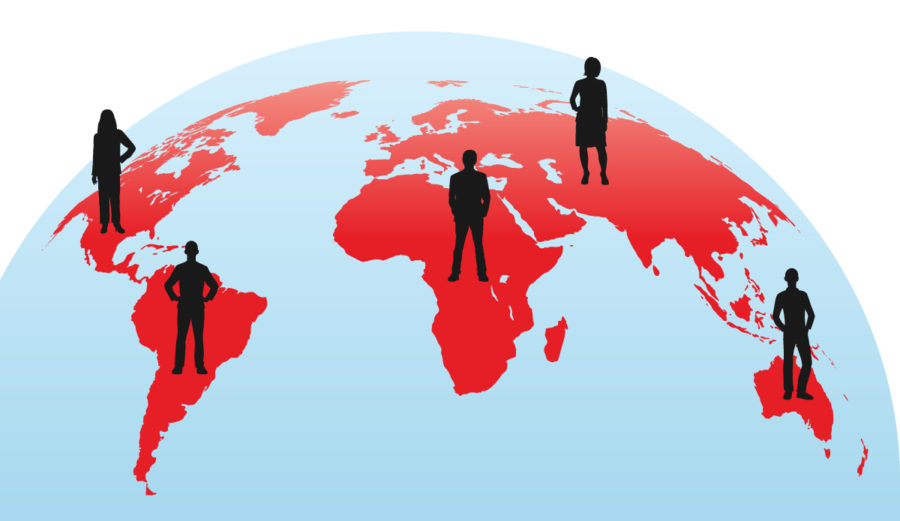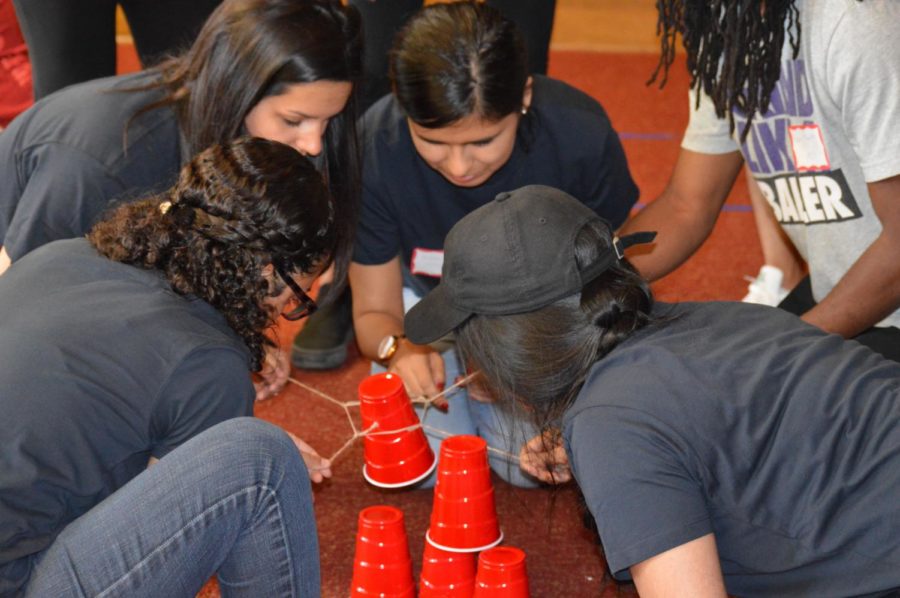World AIDS Day brings advocacy to those affected
December 1, 2019
World AIDS Day has been recognized on Dec. 1 since 1988. This day is an international day dedicated to raising awareness of the AIDS pandemic, caused by the spread of HIV infection. This day is also a day to mourn those who have died of the disease.
Acquired immunodeficiency syndrome, or AIDS, is a chronic and life threatening disease caused by the human immunodeficiency virus, or HIV. It can be transferred sexually, during childbirth or through blood. Treatment can slow down the progression of the disease, but currently there is no cure. An estimated 36.7 million people worldwide live with the virus HIV, according to the official World AIDS Day website.
According to hiv.gov, approximately 1.1 million people in the U.S. are living with HIV today. About 15 percent of them, or 1 in 7, are unaware they are infected.
In addition, there were approximately 38,700 people who became newly infected with HIV in the United States in 2016. After about five years of substantial declines, the number of annual HIV infections began to level off in 2013, to about 39,000 infections per year.
At Iowa State, there is an organization bringing attention to the AIDS pandemic, and that is the Global Health and AIDS Coalition.
Madeline Haeffele, the president of Global Health and AIDS Coalition and a senior in kinesiology and health, said this student organization is a club on campus that pushes focus on knowledge and funding within the political arena toward accessible health care. A major aspect of this organization is advocacy and outreach for health care, specifically health care regarding HIV and AIDS.
Haeffele said outreach through this organization consists of many things inside and outside of Iowa State. One of the many things the Global Health and AIDS Coalition does is Fall Uprising, an event where student members of the organization go to Washington D.C. in October to go to conferences and meetings to discuss policies and funding for research for HIV and AIDS. The organization also has congressional meetings in Iowa with congressmen and women about policies in the state of Iowa.
In the Iowa State community, however, they have events like a lecture series that will be returning in Spring semester, as well as table events outside of Parks Library on Wednesday.
“We brought individuals to speak at these lectures who live with HIV and AIDS,” Haeffele said. “Something coming up this current week is we’re holding a tabling event where we will be handing out information regarding free testing days and access to health care at the Thielen Health Center at Iowa State, as well as Polk County Health. Our goal is to make sure people know where they can go to get the health care they need.”
During this tabling event, the Global Health and AIDS Coalition will be handing out red ribbons to people to show support for those who live with HIV and AIDS as well as mourn those who have lost their lives to AIDS. Haeffele said the Global Health and AIDS Coalition’s goal is to show support for these individuals on and off campus.
Haeffele said the awareness that a day like World AIDS Day brings is very important for college students to acknowledge because this age group is sexually active and can be exposed to other risk factors, such as exposure to needles. Knowledge gained from World AIDS Day can help anybody who does have any sort of needle usage in their day to day life become aware of the risks regarding sharing needles.
The main organization leading in national efforts to end AIDS and bringing awareness to the virus is UNAIDS. This organization is leading the global effort to end AIDS as a public health threat by 2030.
UNAIDS uses problem solving, strategic direction, advocacy, coordination and technical support needed to catalyze and connect leadership from governments, the private sector and communities to deliver life-saving HIV services internationally.
Every year there is a theme for World AIDS Day, and the theme of this year’s World AIDS Day is “Communities make the difference.”
According to UNAIDS, the commemoration of World AIDS Day is an important opportunity to recognize the essential role that communities have played and continue to play in the AIDS response at the international, national and local levels.
“Communities contribute to the AIDS response in many different ways,” according to the UNAIDS website. “Their leadership and advocacy ensure that the response remains relevant and grounded, keeping people at the centre and leaving no one behind. Communities include peer educators, networks of people living with or affected by HIV, such as gay men and other men who have sex with men, people who inject drugs and sex workers, women and young people, counsellors, community health workers, door-to-door service providers, civil society organizations and grass-roots activists.”
According to the UNAIDS website, World AIDS Day gives an opportunity to offer an important platform to show the roles that communities play when reduced funding and a shrinking space for civil society are putting the sustainability of services and advocacy efforts in jeopardy. The advocacy role played by communities is needed more than ever to ensure that AIDS remains on the political agenda, that human rights are respected and that decision-makers and implementers are held accountable.
The Centers for Disease Control and Prevention estimates that the decline in HIV infections has plateaued because effective HIV prevention and treatment are not adequately reaching those who could most benefit from them. These gaps remain particularly troublesome in rural areas and in the South and among disproportionately affected populations like blacks/African Americans and Hispanics/Latinos.
However, organizations like UNAIDS, The Global Fund and the World Health Organization are fighting to raise awareness for the AIDS pandemic, and to reach those who suffer from the HIV/AIDS virus.
“The 2019 slogan for World AIDS Day is ‘Community by Community,’” Haeffele said. “We really want to put the focus on the idea that someone within your community could be affected by HIV or AIDS and that communities should be working together to educate and respect each other, as well as destroy this stigma behind HIV and AIDS.”
Haeffele said she wants to encourage people to talk about the HIV/AIDS pandemic and fight the stigma that has been created because of it. She also wants students to know the importance behind the campaign to end the AIDS virus, and that the Global Health and AIDS Coalition organization is there to help provide information and help start conversations in the Iowa State community.
During World AIDS Day you can go to www.worldaidsday.org or www.nat.org.uk and donate to the #ROCKTHERIBBON campaign to help raise awareness and help those who have HIV/AIDS receive treatment.

















